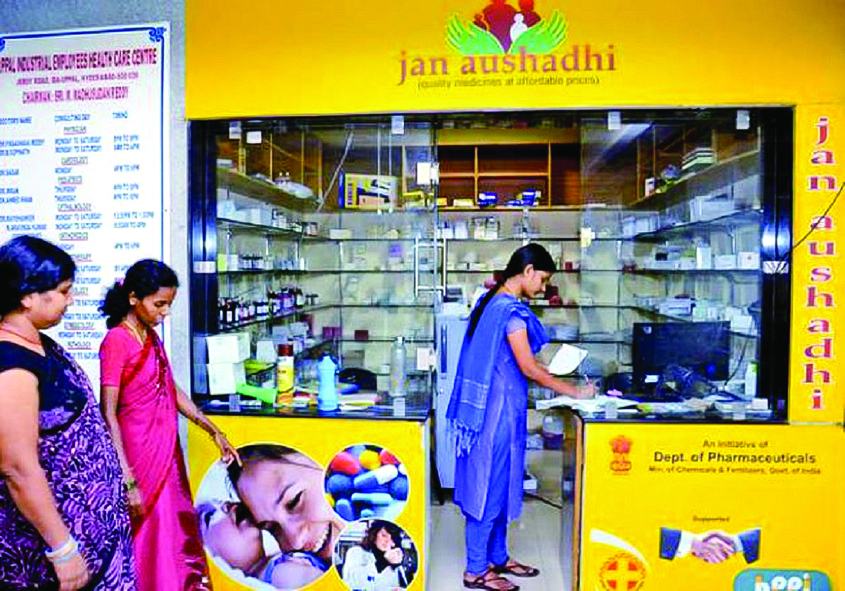“I think it’s a welcome move, but we have a long way to go to crack down on this nexus effectively. Quality assessment, price control and availability of generic drugs hold the key to address unethical practices that hinder affordable healthcare,” said Dr Jayaprakash, additional professor and child psychiatrist unit chief in Trivandrum Medical College.
Acting on reports that the unholy relationship between pharmaceutical companies and doctors pushes over 32 million people below poverty line, owing to expenditure on medical care, Prime Minister Modi announced last month that the government would formulate a legislation to arrest the trend. He was speaking during the inaugural ceremony of a multispecialty hospital in Surat.
PILL PUSHER
According to reports, pharmaceutical companies pump in around 7% of their turnover, around Rs 4,200 crore, into marketing and promotional activities. Prohibited to advertise the drugs, this amount is used as bait for doctors to influence their prescription practice.
“By default the prescriptions by considerable number of doctors are of the costliest brand when the much cheaper alternative of the drug, which is of equal quality, are available in the market,” said Dr Mira Shiva of All India Drug Action Network (AIDAN).
Under the pretext of drug promotion, medical representatives allegedly use unethical methods to influence the doctors to prescribe their medicines.
Talking to this newspaper, a medical representative of a leading pharmaceutical company revealed that it starts in the form of modest flattery like offering pens, calendars and prescription pads and leads on to funding foreign trips and covering education expenses of doctors’ children.
“During our training we are taught three Cs—convince, confuse and corrupt. We are directed to convince the doctor to prescribe our drugs, even if it means offering them bribes or gifts,” alleged a Kanpur-based medical representative under the condition of anonymity.
“Medical ethics prohibit doctors from even accepting a prescription pad from the pharmaceutical companies. However, many doctors accept gifts from these companies,” said Dr Jayaprakash. He further noted that this nexus is not limited to drug companies but extends to diagnostic laboratories as well.
“For an MRI, which costs Rs 6,000-7,000, around 40%-50% goes to the referring doctor. After striking a deal, the diagnostic laboratories open an account in the name of the doctor and for every referral the commission is directly deposited into their account,” he alleged.

IRRATIONAL PRESCRIPTIONS
The hand-in-glove association of the doctors and pharma giants has resulted in unprecedented rise in the irrational prescriptions of drugs, such as cough syrups, digestives and cognitive drugs that do not have any scientifically proven therapeutic merit.
“In neuroscience, there is no proven drug which can boast of improving memory or intelligence effectively. However, doctors still prescribe costly cognitive drugs,” claimed Dr Jayaprakash.
Furthermore, irrational prescriptions by doctors, allegedly fed and bred by pharma companies, pushes costly medicines over the generic versions that are priced around 40%-50% less than the branded medicines.
Pharmaceutical companies pump in around 7% of their turnover, around Rs 4,200 crore, into marketing and promotional activities, which is used as bait for doctors to influence their prescription practice, as they aren’t allowed to advertise the drugs.
“The manufacturing of Atorvastatil costs around Rs 3, which is more or less the same for branded and unbranded drugs. While the generic version is sold for Rs 6 in the market, a branded version sells for around Rs 60-65. This is because ceiling prices are determined on the basis of market-based mechanism,” said S. Srinivasan, who runs Low Cost Standard Therapeutics and is associated with AIDAN.
According to doctors, generic medicines are the ones that are sold under their International Non-proprietary Names (INN) in the later stage of the drug cycle, which is after the patent of the pioneering drug expires. By default, all drugs come into the market as branded. For a stipulated period, the pioneering company sells the drug in the market at a high price to recover its expenditure on research and development of the formulation. Once the patent expires, other companies start selling the same formulation at a much cheaper price. However, even after the patent expires, the pioneering companies continue to sell the medicine at the same price.
“The ingredient that cures the disease remains the same. The notion of higher the cost, better the quality is a myth circulated by the big pharmas. In many cases the drugs are manufactured by one company and marketed by someone else. Our generic drugs are exported in huge quantities. The UNICEF and Doctors without Borders buy these generics in huge quantities,” claimed Dr Mira Shiva of AIDAN.
MISPLACED DEBATE
Experts unanimously told The Sunday Guardian that the debate over generics and branded medicines is misplaced. They believe that the discussions should instead be about formulation of Rational Drug Policy that enforces proper quality assessment, permanent licensing, availability of generic medicines, robust “pharmaco-vigilance”, banning of irrational drugs and the use of cost-based pricing, instead of a market based pricing mechanism, to determine ceiling prices for medicines.
“There has to be a comparative drug therapeutic analysis on cost, quality and availability of generic drugs. A rational drug policy would ensure that a proper quality assessment of all the drugs entering the drug market is in place, that a ceiling price is determined on cost-based mechanism and that irrational drugs are banned, while the availability of essential drugs is increased,” Dr Shiva added.

